Hanoi travel highlights
Photographer’s dream - Hanoi is one of Asia’s most photogenic cities. Architecture, street life, people and food - it’s all there.
History - Hanoi and the Red River Delta are where Vietnam’s story begins. The city’s historic heart is still beating amidst the rush to modernity.
Street food - Hanoi’s street food scene is a cultural and culinary delight.
Museums - Vietnam’s best museums are found in the capital
Make it your base - Hanoi is the best place for accessing some of Vietnam’s most loved places - Halong Bay, Sapa, Mai Chau, Ha Giang, Ninh Binh, Pu Luong and more. Check out our guides to these places too.
Get the details in our Hanoi see and do listing.
Introduction continued...
Hanoi may have been slow to change, but these days, it’s in a rush. And the challenges to the city’s age old rhythms are real. Life in Hanoi was hit especially hard during the COVID lockdown years of 2020 and 2021 - though the recovery seems to have been rapid and things feel pretty normal now.
Hanoi is rich in tradition and the source of much of Vietnam's legend, literature, music and poetry, but upheaval and consumerism have been the defining themes of the past two decades.
Grand old heritage buildings disappear. Pagodas are renovated beyond recognition. The upheaval strikes family life too.
The past decades has seen the city dealing with an increasing pollution problem - that can be quite unpleasant as you wander the streets. In early 2024, there were days when Hanoi registered the worst air quality in the world. I note that with extra unease as an Australian as at least some of the pollution problem comes from cool-fired power plants powered by Australian coal. Australia's largest export to Vietnam is coal.
Flooding has always been an issue in low-lying Hanoi. Climate change seems to be worsening the problem. You may experience it first hand between July and August though its impact is usually short and sharp.
So soon after embracing consumerism at full throttle, in some quarters at least, Hanoians are showing signs of fatigue. Many young people are animated by environmental issues - evidenced by the huge campaign that mobilised against plans to cut down thousands of the city's magnificent colonial-era trees in early 2015. Pollution problems are now a constant talking point. Hanoi’s young have quickly worked out that their future well-being won’t measured in GDP alone.
Others are concerned by the age-old threat from China that has resurfaced over competing East Sea (aka. South China Sea), claims.
Hanoi has also led Vietnam's influential "Pride" movement - agitating for LGBTQi rights.
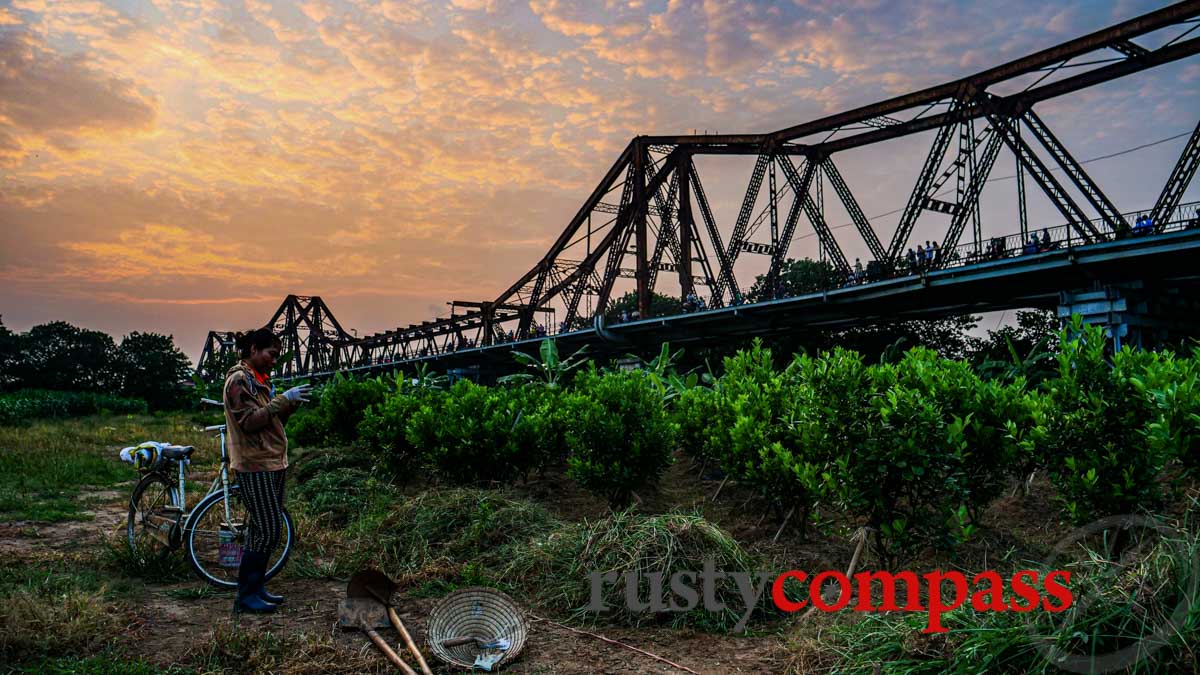
Photo: Mark Bowyer Long Bien Bridge, Hanoi
For centuries, national heroes have been created here, leading armies against Chinese invaders. And it was from Hanoi that Vietnam’s long southward march to its modern borders began in the 11th century - picking up Cham and Khmer territory along the way.
In the early twentieth century a national movement took shape in French administered Hanoi that went on to evict colonial forces in 1954, before humbling the United States 21 years later.
But Hanoi’s victories over foreign aggressors have come at a terrible human cost. The twentieth century was a rolling disaster of colonial repression, hardline communism, war and famine, briefly interrupted by victory celebrations. The relative prosperity of the present has been hard won.
Even in 1976 when Hanoi officially became capital of a peaceful, unified Vietnam, the dividend was continuing misery and dire poverty. The nation’s communist leaders proved unable to translate battlefield success into post-war prosperity.
By the late 1980s, the communist hardliners had cracked. Limited market reforms were put in place and a rapid economic turnaround began to smooth over the hardest edges of life in the city. But Hanoians, conservative by nature, were slow to take up the new opportunities of economic reform.
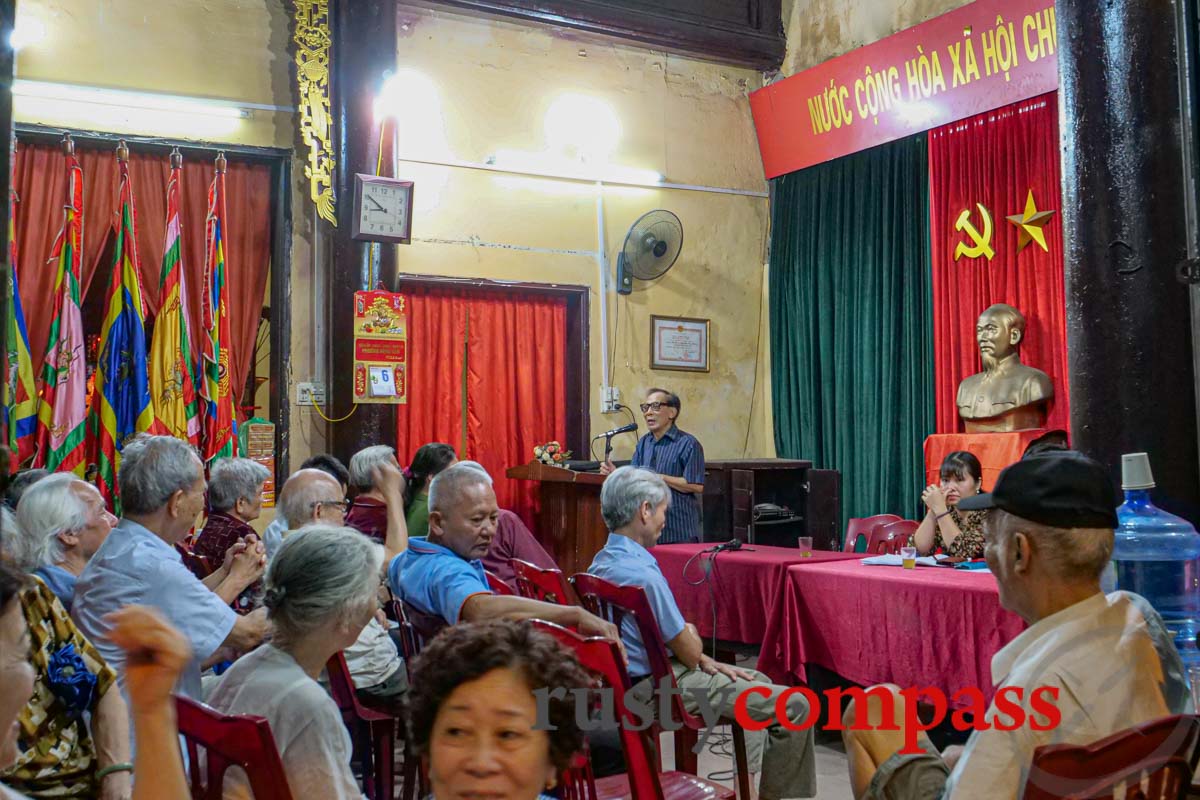
Photo: Mark Bowyer Party meeting in the Old Quarter - Hanoi
In the mid 1990s, congenitally commercial Saigon began to race ahead of the capital.
During the past decade, Hanoi has started to catch up. The capital today is a captivating collision of generational extremes. The elderly, steeped in tradition, formed by battle and sacrifice - the globalised young, impatient and acquisitive. Bentleys and BMWs ply streets that were congested with bicycles only a generation ago.
It could be the story of any city. But here, the extremes are magnified many times by the excessive hardship of decades past and the wealth at the fingertips of many in Hanoi’s young elite.
Much of Hanoi’s daily life still unfolds on its busy cramped streets. It’s a dramatic visual feast, perfect for photographers. The human landscape - especially Hanoi’s ever visible elderly - is a big part of its magnetism.
Hanoi’s streets are home to an impressive food culture. Locals are rightly proud of their culinary specialties. Avoid debating whether pho noodle soup is tastier in the north or the south. Don’t limit yourself to pho. Other local dishes like bun cha, banh cuon and cha ca shouldn’t be missed.
Hanoi has long been one of our favourite cities. The profound bitter sweetness of its past still imbues its contemporary persona.
Few places are as rich in history and character. But Hanoi retains an elusive quality and reveals just enough to keep your interest piqued.
For information on travel to Hanoi, read on.
For our Hanoi see and do guide, click here.
For our Hanoi eating guide, click here.
For Hanoi nightlife tips, click here.
For Hanoi hotel info, click here.
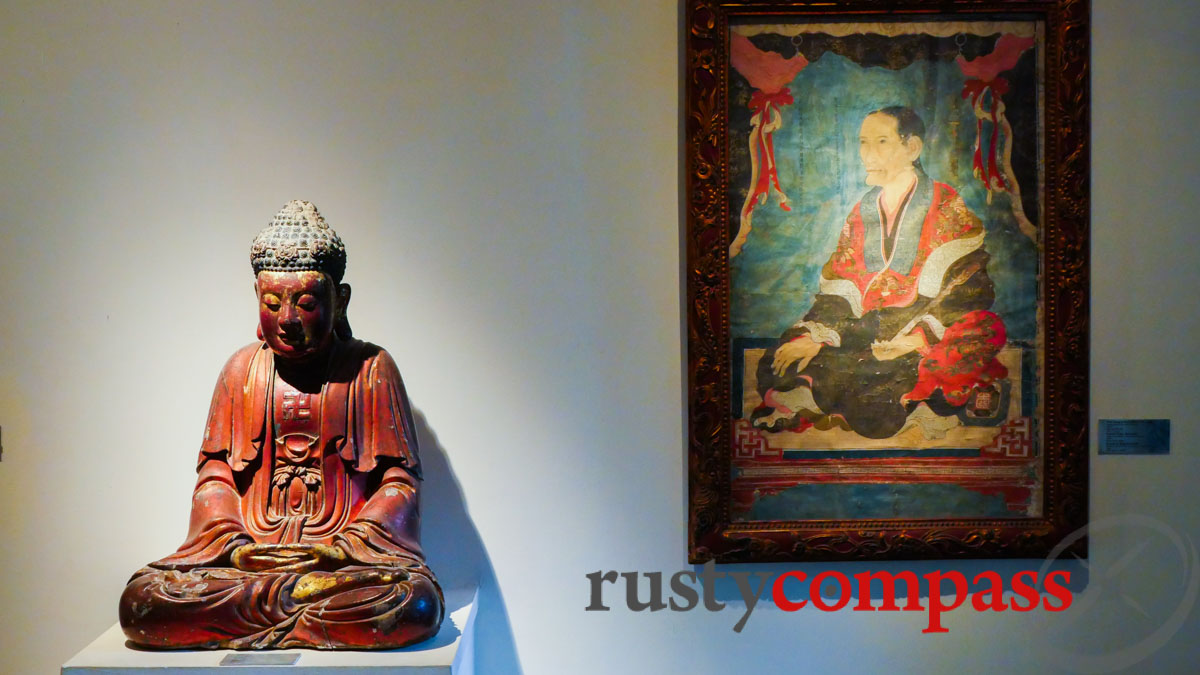
Photo: Mark Bowyer Fine Arts Museum, Hanoi
Hanoi need to know
Hanoi Airport
Hanoi’s airport, the second busiest in the country, tends to be a straightforward experience for international and domestic travellers. Both terminals are in the same complex. Make sure you check whether you need a visa in advance. Visa rules keep changing and they’re less predictable than most countries. Read more about visas here.
A taxi from Hanoi airport will cost between 350k VND and 400k VND. Grab is cheaper (Uber has exited Vietnam). The airport taxi experience is usually pretty unpleasant with loads of hustle and plenty of scammers - just what you don't want on arrival in a new city. We recommend the public bus - just 35K VND. It departs every 20 minutes and stops at several key points enroute to the city. You’ll probably need to get a taxi when you get off the bus downtown - but you’ll have saved both money and the frequent headaches of dealing with taxi drivers. Plus you'll have notched up your first "local" Hanoi experience.
Domestic flights
Vietnam Airlines, Jetstar Pacific and Vietjet operate multiple daily flights from Hanoi to major domestic points like Ho Chi Minh City (Saigon), Hue, Danang, Nha Trang, Dalat, Phu Quoc Island as well as Dien Bien Phu. Daily flights operate to most other population centres in the country as well. A new player, curiously named Bamboo Airways, commenced services in 2019.
Trains
Hanoi's French era railway station is right downtown. The unsightly Soviet style section in the middle was added after the original structure was damaged by US B52s in the 1972 Christmas bombing.
Rail services operate south from Hanoi along the coast all the way to Saigon including major points Hue, Danang and Nha Trang.
The train from Hanoi is the most popular route for travel to Vietnam’s far northern mountains around Sapa - though new roads make the 5 hour bus service popular as well.
The journey to Lao Cai, the gateway to Sapa and the northern mountain country, is under 9 hours and there are many services operating - mainly in the evening. Trains are also a cheap and enjoyable way to travel to nearby places like Ninh Binh, Nam Dinh and Haiphong.
A relatively small number of hardy travellers take the train from Hanoi to the Chinese city of Nanning. These connect to Beijing and other points in China. As schedules and details change, check this out when you’re on the ground and keep in mind you need a visa to enter China.
Road
From Hanoi, road travel to Halong Bay, Ninh Binh, Hoa Lu and Mai Chau, Ha Giang and Cao Bang is common. Hanoi is the access point to some of Vietnam’s best travel experiences.
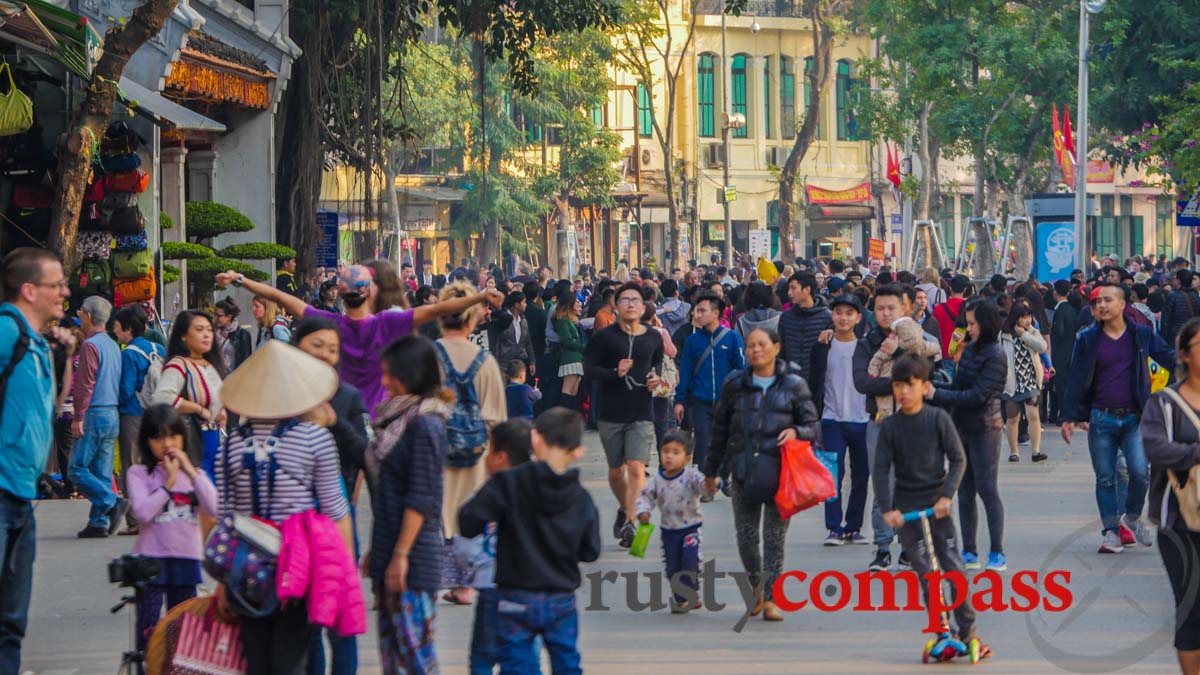
Photo: Mark Bowyer Hanoi's weekend walking precinct.
Getting around in Hanoi
Hanoi is an easy and enjoyable place to get around. While the Old Quarter is notoriously easy to get lost in, it’s small enough that it never takes long to get your bearings back. The Old Quarter’s jammed with commerce, people, motorbikes and cars so it’s a pretty intense walking experience. Other parts of the city are more friendly to walkers. More than likely, you'll mix things up with some walking, cyclo rides, motorcycle taxi and taxi rides.
SPECIAL NOTE HANOI TAXI SCAMS 2024
Hanoi has always had its fair share of dodgy taxis. In 2024, this seems to be spiralling out of control. Hanoi Taxi and Mai Linh are the most reliable. Reports of bad Hanoi taxi experiences seem to be growing. We’ve had our fair share of problems lately too - and we know the city well. Some taxis have dodgy meters. Many drivers refuse to turn their meters on. Other drivers simply demand excessive payments at the end of a ride.
Taxi scammers are especially nasty around Ba Dinh Square - the most revered place in the city where Ho Chi Minh's Mausoleum is located. Pity Hanoi's ethical taxi companies and drivers - trying to operate in such a grim scam-fest.
Grab (the Uber of South East Asia) has its own problems - but it is a lot more reliable than Hanoi's taxis. Grab drivers often spend more time looking at maps on their phone than the road while driving. Many have no idea where they’re going. On balance though, Grab is reasonably reliable. Grab's offerings include a motorcycle taxi service that's cheap, reliable and great for shorter journeys. Download the app to use Grab.
It pays to always be confident about where you’re headed - name, number and address.
On foot
Apart from the heat and humidity in summer, Hanoi is a good city for walking. The Old Quarter is chaotic but we’d recommend spending as much time as possible on foot. It’s a great way to get to know the city - especially Ba Dinh and the French Quarter where paths are less congested. If you enjoy walking, you can see nearly everything in Hanoi on foot.
Cyclos
Cyclos are still a fun way to get around Hanoi. Be sure to clearly agree your price in advance and remember that these days, a cyclo is usually costs quite a bit more than a taxi.
Some travellers have reported nasty experiences with cyclo drivers threatening them and grossly overcharging. Be careful and be absolutely clear on your pricing. Cyclos seem to be demanding around 100,000 or more per hour these days.
Xe Om - Grab Bike
Motorcycle taxis (known as xe om which translated, literally means hug bike - you have to hold on to your driver to stay on) took over from cyclos in the 90s and remain popular. Grab bikes are another option. They’re everywhere and bookable via the Grab app.
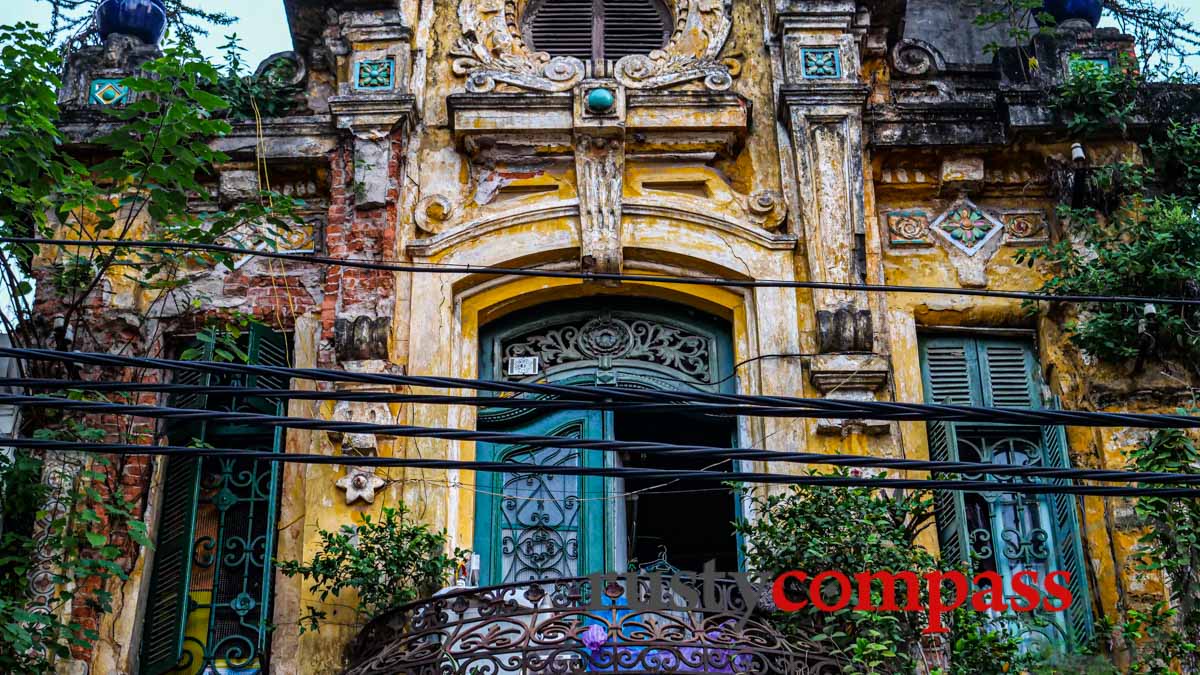
Photo: Mark Bowyer Crumbling colonial icons - Hanoi
Mobile, internet and phones in Hanoi
Vietnam’s 4G phones system coverage is extensive, reliable and good value for money. You can buy SIM cards at the airport in Hanoi (they seem to put a price premium on a “tourist card”) or pick a SIM up downtown. 300 - 400K VND should give you ample data (8GB a day) for a month - especially as wifi is available everywhere too. Viettel and Vinaphone are the best carriers and both have good national coverage. If you need to pick up a phone, phone shops are everywhere in central Hanoi.
Health and safety in Hanoi
Hanoi is a relatively safe destination for travellers. Violent crime against foreigners is rare. There are some hazards worth noting though and these problems seem to be getting worse as inflation, economic hardship and drug related crime, afflict Vietnam.
Common scams and crimes in Hanoi:
Taxi, cycle and xe om scams are definitely the most pervasive in Hanoi. See above. Take care with all.
Bag snatching: Travellers sometimes fall victim to bag snatchers on motorbikes when crossing the road though this is far more prevalent in Saigon. Be very careful with your valuables. Cameras are especially prized by thieves. Pickpockets have been an occasional problem in the past and target travellers around Hoan Kiem Lake.
Dodgy tours. Hanoi is infamous for dodgy tour companies selling cheap Halong Bay, Hoa Lu / Tam Coc Sapa and Mai Chau tours - the problem is especially bad with Halong Bay tours. Ha Giang loop tours are the latest offering of scammers. If your hotel feels dodgy and untrustworthy, don’t trust them to handle your Halong Bay or any other tour. There are plenty of reputable operators. Good hotels also tend to be dependable in booking these services - you'll pay a premium.
Late night crime: Hanoi’s nocturnal scene is pretty subdued by big city standards and this means that there are very few incidents. Your taxi is probably the weak link in your night-time chain. Taxis lurking around late-night venues are a high chance to be hoping for an ignorant foreigner windfall.
If you’re a victim of crime, the Vietnam police experience is likely to be unsatisfying. Reporting a crime can be a serious hassle and empathy is not the strong suit of the local constabulary. You may need a statement for insurance purposes however, so persist.
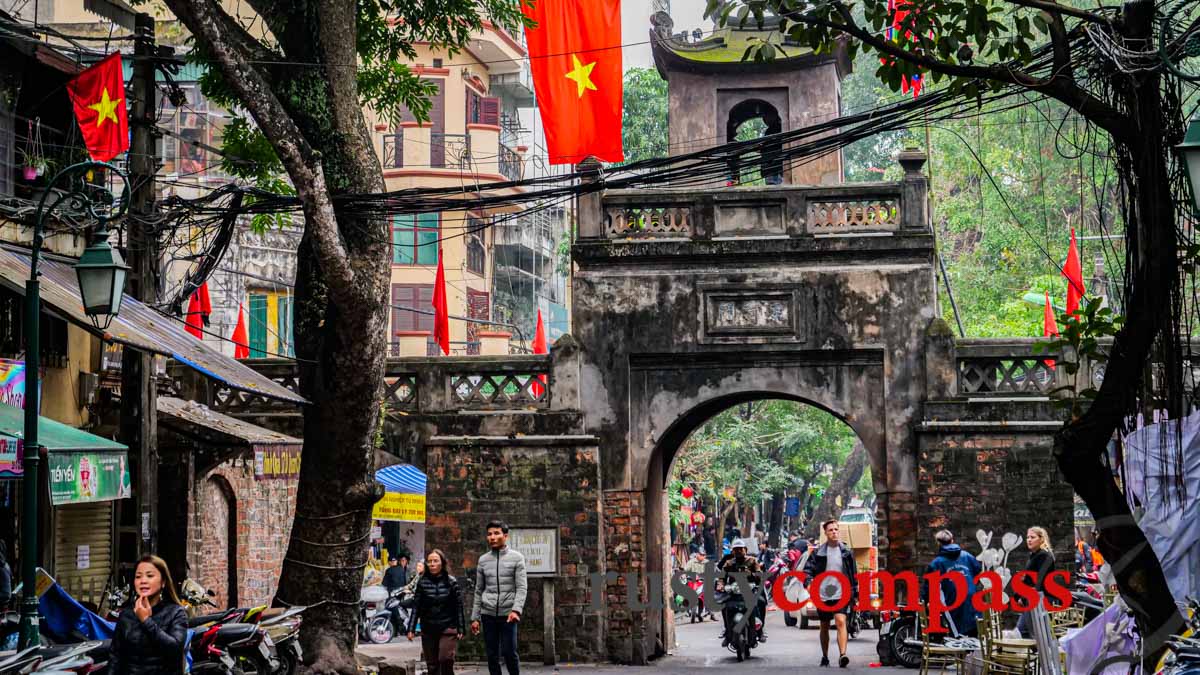
Photo: Mark Bowyer Hanoi's Old Quarter
Health
Hanoi’s medical facilities for travellers have improved lots during the past decade but they’re still behind Saigon in the south and well behind the best regional and international standards both in expertise and facilities. Seriously ill patients are commonly airlifted to Singapore, Bangkok and Hong Kong.
Here is a list of international medical facilities in Hanoi:
Hanoi French Hospital
No.1 Phuong Mai, Dong Da, Hanoi, Vietnam
Telephone: 84-4-5771100
Website: http://www.hfh.com.vn
International SOS
Unit A, Central Building,
31 Hai Ba Trung Street, Hanoi
Telephone: (04) 9340555 (also for 24 hour emergency), (04) 9340666
Hanoi Family Medical Practice
Suite 109-112, Building A1,
Ground Floor
Van Phuc Diplomatic Compound,
Hanoi
Telephone: (04) 8461748/9 Mobile: 0903401919 (24 hour emergency)
http://www.vietnammedicalpractice.com/

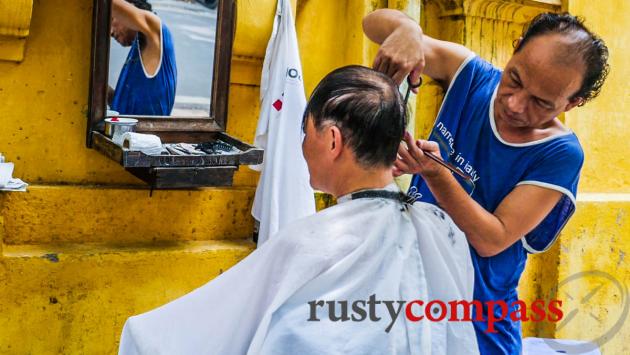
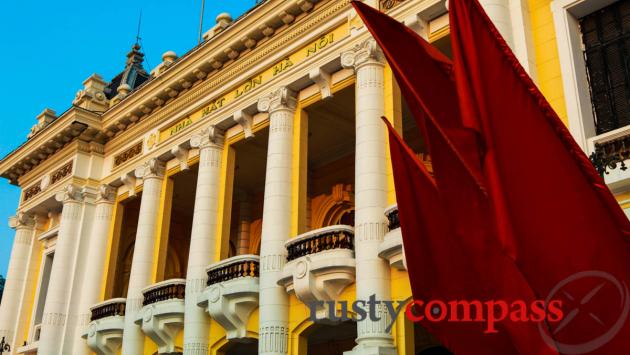
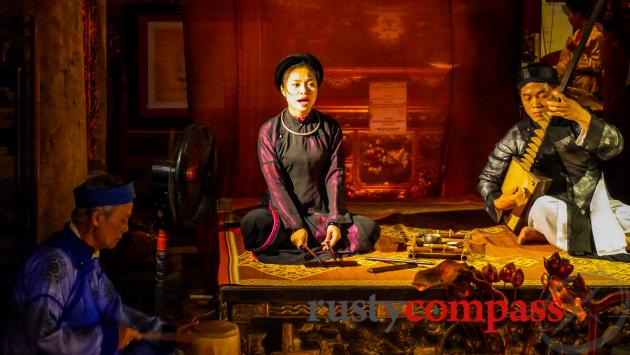
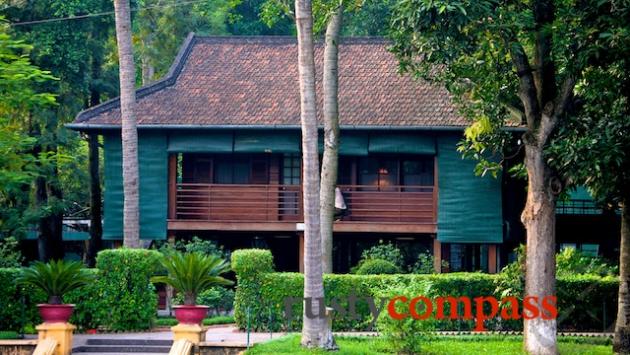
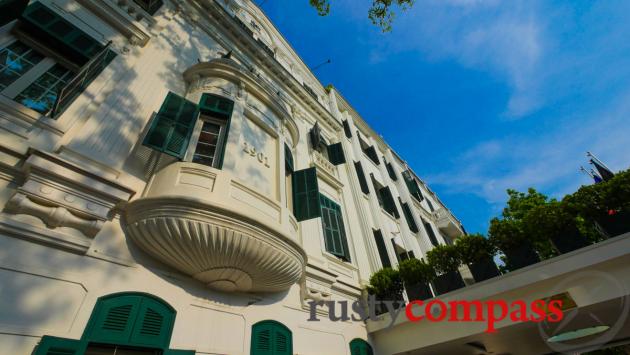
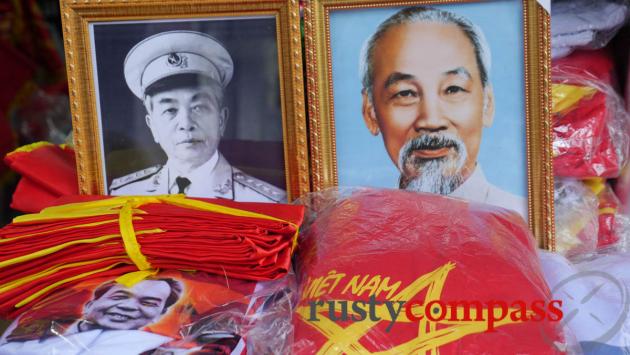
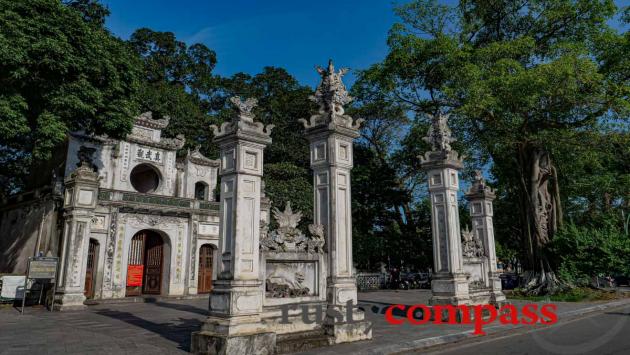
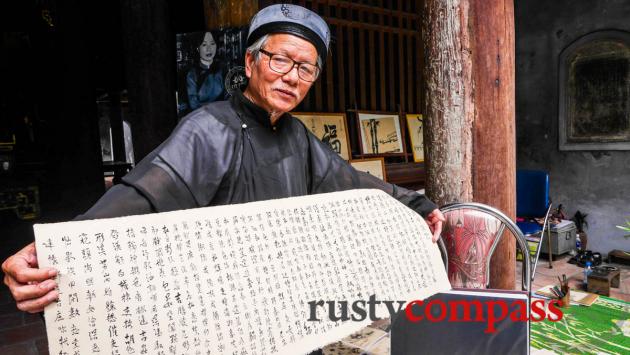
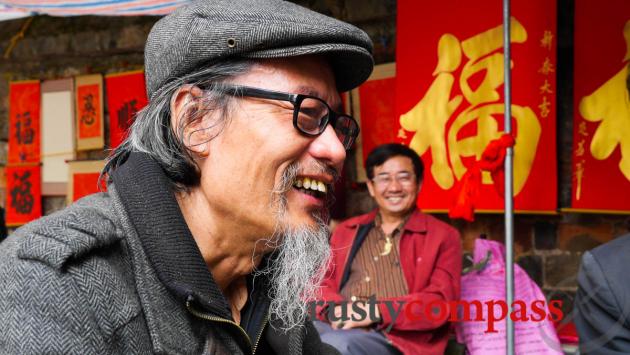
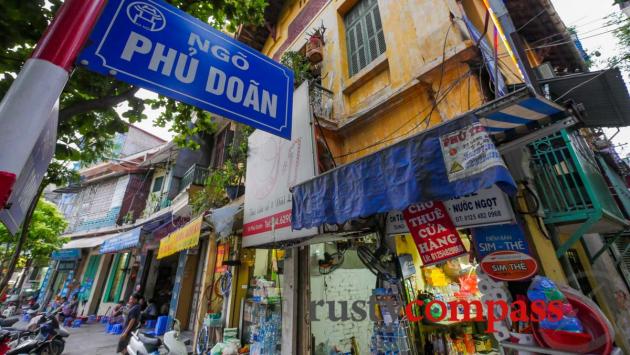
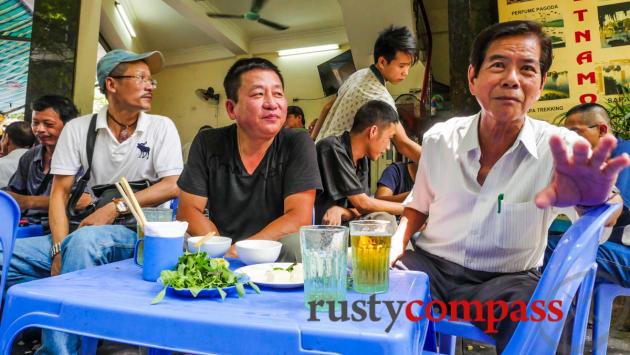
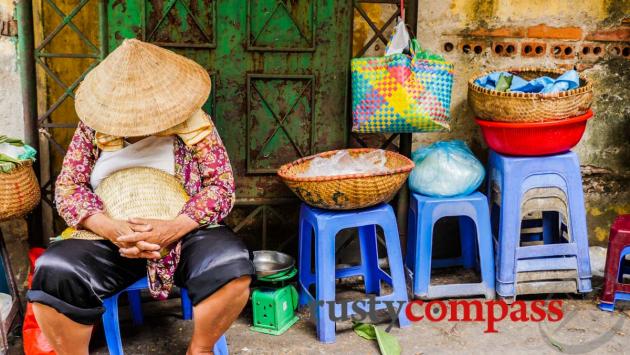
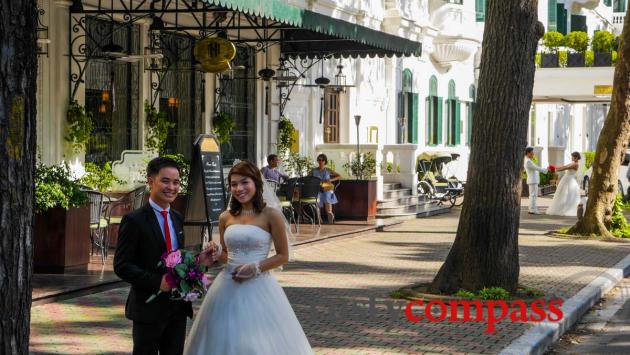
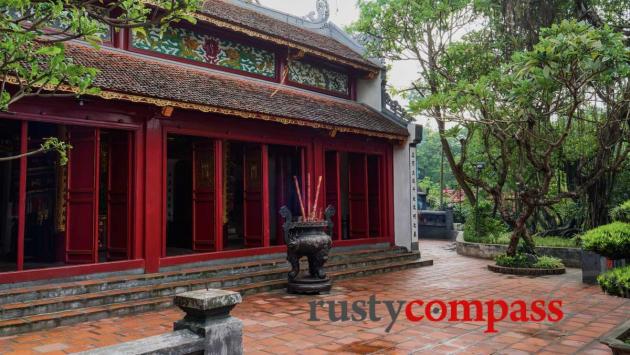
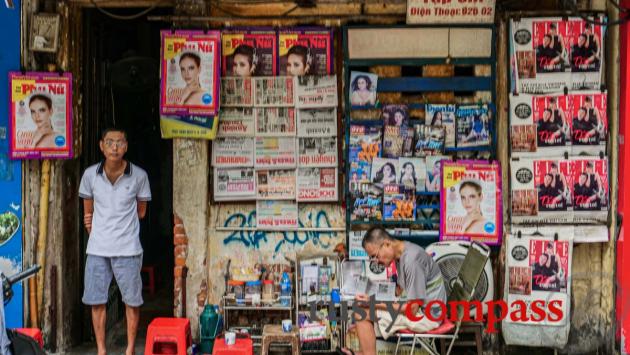
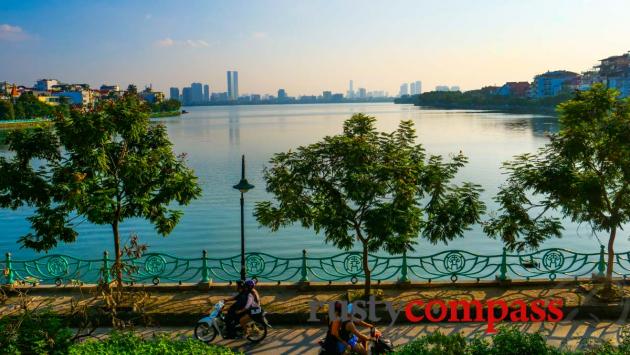






Twitter: @rustycompass
Rusty Compass is an independent travel guide. We’re focused on providing you with quality, unbiased, travel information. That means we don't receive payments in exchange for listings and mostly pay our own way. We’d like tourism to be a positive economic, environmental and cultural force and we believe travellers deserve disclosure from publishers. Spread the word about Rusty Compass, and if you're in Saigon, pop in to The Old Compass Cafe and say hi. It’s our home right downtown on Pasteur St. You can also check out our unique tours of Ho Chi Minh City and Sydney at www.oldcompasstravel.com Make a financial contribution using the link below. Even small amounts make a difference. Thanks and travel well!